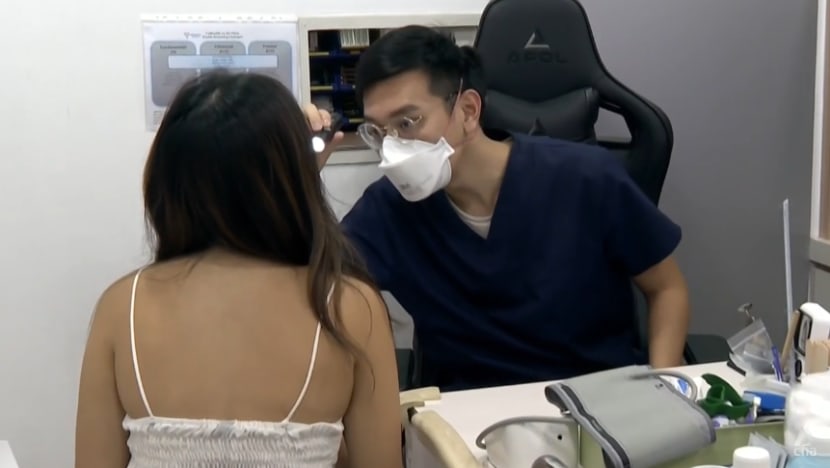Clinics pump in more resources to combat spike in COVID-19 cases, respiratory infections
Singapore has seen a jump in COVID-19 infections in recent weeks, with the new KP.1 and KP.2 strains, part of the family of “FLiRT” variants, accounting for about two-third of the cases.

A doctor attends to a patient at a Unihealth clinic. Doctors are urging the public to keep up with vaccination amid a recent spike in COVID-19 inflections.

This audio is generated by an AI tool.
SINGAPORE: As Singapore rides a new COVID-19 wave, some clinics are putting in more resources, including extra manpower and medication supplies, to cope with the rise in the number of patients.
Some clinics are also reporting an increase in patients suffering from other acute respiratory conditions such as the flu or common cold.
Clinic chain Unihealth said it has seen twice as many patients with COVID-19 infections this month compared with April, accounting for about 20 cases per day in each of its three outlets in Jurong, Toa Payoh and Yishun.
While the situation remains under control, the company said it is stocking up on medication for various symptoms including cough, runny nose and fever.
As sore throat is one of the most common complaints from COVID-19 patients, Unihealth has ramped up its supply of throat sprays and antipyretics, which reduces fever, body pains and chills.
Test kits for COVID-19 as well as influenza have also seen an uptick in demand, said the firm’s medical director Dr Xie Huizhang.
Dr Xie expects the current wave of infections to persist for several more weeks, as the school holidays kick off and families make overseas trips.
“People are travelling in and out (of Singapore). There may be a rise in ARI (acute respiratory infection) cases in general, which may linger around and may last until mid-July,” she said.
SURGE IN COVID-19 CASES
Similarly, telehealth service WhiteCoat has received up to 10 per cent more patients this month compared with April.
With a large team of in-house and partner doctors, the firm said it has been able to deploy more hands on deck to meet the current demand.
Since the second half of April, the company has placed about 20 per cent more doctors on its roster, especially for peak periods such as in the mornings.
Dr Tan Ming Wei, WhiteCoat’s senior medical director, told CNA: “Based on our data and past numbers, (we were) able to see the uptick quite quickly and predict that the wave was coming.
“So, we have been able to schedule doctors earlier and plan more manpower in advance to cope.”
The company has also increased its medicine inventory over the years, recently moving to a larger warehouse to accommodate more variety and quantity.
SUCH WAVES NOT UNCOMMON
Doctors said the current surge in patients seeking attention over COVID-19 and respiratory infections is not unusual.
“COVID-19, like other flu and viruses, has become a common respiratory infection. We expect two or three waves per year, especially with the emerging strains as well,” said Dr Xie.
Singapore has seen a jump in COVID-19 infection in recent weeks, with the new KP.1 and KP.2 strains – part of the family of “FLiRT” variants – accounting for about two-third of the cases.
Dr Tan said the new strains are mild. While the public should not be overly concerned, those who are more vulnerable, including the immunocompromised, should practise preventive measures.
“So far, new variants have not caused an increase of complications or severity,” he said.
“But those who are at risk – the elderly, those with chronic diseases, pregnant mothers – should take precautions.”
HEALTHY HABITS AND VACCINATION
Doctors also attribute the spike in inflections to waning immunity, urging the public to keep up to date with vaccinations.
They also advised people to be socially responsible and practise healthy habits to reduce the spread of such diseases. These include staying hydrated, handwashing, staying home when unwell and masking up if one is displaying respiratory symptoms.
Dr Xie said: “Most patients have already acquired a hybrid immunity – from COVID-19 vaccinations or past infections. However, most patients’ last vaccination or infection may be more than a year ago, so immunity may have waned.”
She added that there has been a recent uptick in vaccination demand. This is in line with a usual surge before and during school holidays, when more people travel.
“It is heartening to see that more people have been heeding the advice to take COVID-19 vaccine boosters,” she said.
“We advocate to have annual vaccine checks – be it flu vaccine, COVID-19, or pneumococcal vaccines for the elderly.”


















